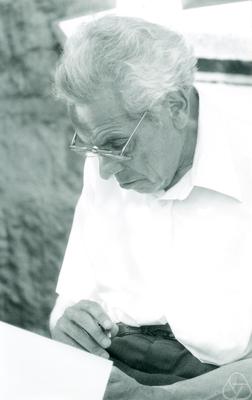Today is the 100th anniversary of the birth of Paul Erdős, or as most people would call it, Erdős’ 100th birthday. So, Happy Birthday Paul. And if you’ve never heard of him, let’s see what people at his birthday party are saying about the Man Who Loved Only Numbers. Please note: all birthday parties are strictly fictional.

Probably the greatest mathematician of the twentieth century, Paul Erdős … was so eccentric that he made Einstein look normal. He was 11 before he ever tied his shoes, 21 before he ever buttered toast, and died without ever boiling an egg. Erdős lived on the road, traveling from conference to conference, owning nothing but math notebooks and a suitcase or two. His life consisted of math, nothing else.
– Clifford Goldstein, in The Mules That Angels Ride (2005), p. 125
Born in Hungary in 1913, Paul Erdős was the one of most prolific mathematicians of all time: the honour of most pages published goes to Leonhard Euler, but Erdős has the most papers published in collaboration with others – around 1,525. He worked as a nomad, travelling between conferences and other mathematicians’ hospitality, and wherever he went he created fantastic collaborations with the world’s greatest mathematicians.
Another roof, another proof.
– Erdős’ motto, as quoted in A Tribute to Paul Erdős (1990) edited by Alan Baker, Béla Bollobás, A. Hajnal, Preface, p. ix
Erdős worked in many areas of pure mathematics – combinatorics, graph theory, number theory, set theory and probability theory to name a few. He collaborated with 511 different mathematicians, and was always travelling – his possessions fit in a suitcase, and most of his earnings and awards were generally donated to charity.
Erdős knows about more problems than anybody else, and he not only knows about various problems and conjectures, but he also knows the tastes of various mathematicians. So if I get a letter from him giving me three of his conjectures and two of his problems, then it’s sure that these are exactly the kind of conjectures and problems I’m interested in, and these are exactly the kind of questions I may be able to answer.
– Béla Bollobás, of Trinity College, University of Cambridge in N Is a Number: A Portrait of Paul Erdős (1993)
Erdős died in 1996, while attending mathematical congress in Warsaw. He never retired.
My favorite Erdös quote:
Thanks for reminding us about his great life, Katie!
We’ve been sent this link to a nice Erdős bio:
http://experimentalmath.info/blog/2013/03/march-26-2013-the-100th-birthday-of-paul-erdos/